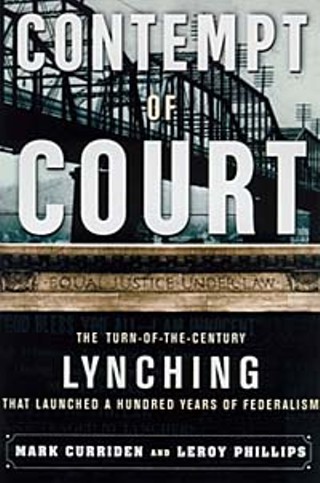Contempt of Court: The Turn of the Century Lynching That Launched a Hundred Years of Federalism
Reviewed by Mark Berman, Fri., Sept. 8, 2000

Contempt of Court
The Turn of the Century Lynching That Launched a Hundred Years of Federalism
by Mark Curriden and Leroy Phillips Jr.
Faber & Faber, 394 pp., $30
On January 23, 1906, Nevada Taylor, the 21-year-old beautiful blond daughter of a cemetery groundskeeper in Chattanooga, was brutally raped on her way home from her job. The sheriff conducted his investigation in a doubly charged atmosphere: It was an election year and there was the looming threat of a race riot. Weeks passed without any leads until an illiterate white day laborer without regular employment came forward to denounce an illiterate, nearly destitute black named Ed Johnson and claim more than a year's salary as reward. Seventeen days later, Johnson was tried and convicted of rape by an all-white jury on the testimony of this one eyewitness. Abandoned by his lawyers, Johnson would have gone to the gallows without the world being any wiser if Chattanooga's foremost black attorneys didn't appeal the case through the state and federal courts before finally winning a stay of execution from the Supreme Court -- a stay, that is, until a lynch mob furious at the federal "interference" assaulted the unguarded jail where Johnson was held. The Supreme Court, equally furious, conducted the first and only criminal trial in its history, hearing contempt charges against the sheriff and members of the mob. Written by Chattanooga attorney Leroy Phillips Jr. and Dallas Morning News legal writer Mark Curriden, Contempt of Court brings wide-ranging research and imaginative reconstruction to detail the 1906 lynching that "launched a hundred years of Federalism," and more immediately put a corrupt and self-serving state criminal court system on trial. Using newspaper articles, court records, and especially witness testimony, Curriden and Phillip's passionate account of the confrontation between a prejudiced and outraged citizenry and the demands of impartial justice is more parable than legal argument.








